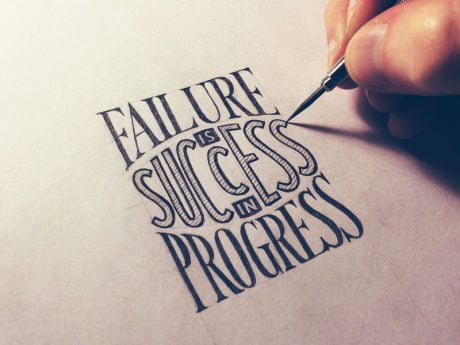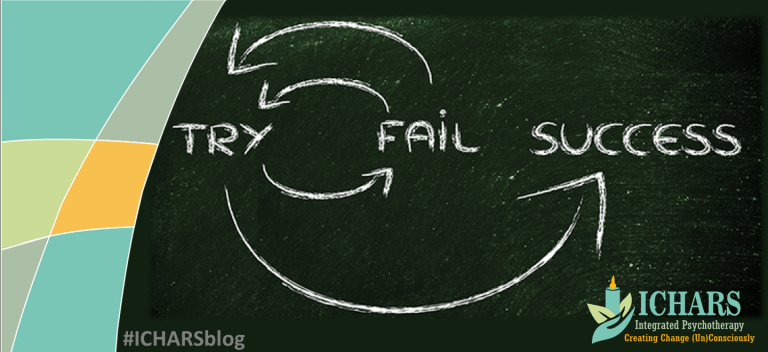Introduction
In this article we will focus on understanding the NLP presupposition “There is no failure , only feedback.”
Think of the first time you tried tying your shoe laces and ended up entangling them badly.
Do you remember your first bicycle ride and how you lost balance and fell down?
Maybe you felt awkward initiating conversations with new people in school/college?
Can you drive well or cook well now? How was it when you were new to it?
Have you developed certain skills now which you didn’t possess earlier? Maybe you write better, use your computer well, manage your finances effectively, sing and dance beautifully and so much more.
A lot that you can do now may have looked difficult to you before or while you were learning to do it. Even if we don’t have vivid memories of such events, all of us surely have been through such things, haven’t we?
Would you now say that you failed that time? or that you were a failure then?
Then why do we keep telling ourselves, “I have failed at ……” or “(person X) is a failure” now?
Consider this story about failure:
 “Two kids (roughly the same age), in their early years, were taught lessons of life by their parents. One is taught to chase success, that failure is bad and one must never fail. Whereas the other is taught to learn from every experience, from everything; that nothing is good or bad. Every experience has the potential to teach us something. So learn from it!
“Two kids (roughly the same age), in their early years, were taught lessons of life by their parents. One is taught to chase success, that failure is bad and one must never fail. Whereas the other is taught to learn from every experience, from everything; that nothing is good or bad. Every experience has the potential to teach us something. So learn from it!
During the course of their lives, the child who was taught to avoid failure never achieved anything great, as he never attempted anything for the fear of failure. Whereas the other achieved a lot more through his experiences!
He states,
“My failures have taught me more than my success! These so called failures became the stepping Stones for my Success..!”
The Problem with Failure

The problem with most of us is that we learn early in our lives that failure is a bad thing. We learn to look at failure as an undesirable outcome instead of realising that it is just a part of the process.
The outcome will depend on how we deal with the overall process, failure being an important part of it.
If we choose to get upset or worked up by it or keep doing the same thing repeatedly in the hope that at some point it will work, then it would lead to an undesirable outcome but if we are able to learn from it and do something different, the outcome may even be better than what we originally desired.
You may be wondering, “So what can I do when I fail?”
- Change your perspective towards failure: One of the important thing to learn that “failure is not a bad thing“. It’s alright if we fail. That life doesn’t end there..! Many great people have failed many times before reaching where they are today. If they saw failure as an outcome, they wouldn’t have achieved half of what they were able to. So change your mindset..! A new understanding of word FAIL can make a lot of difference.
F: Find
A: Another
I: Interesting / Incredible
L: Learning / Lesson
Remember, you can’t change the past, but you sure can change the future, by working on the present. - Handle yourself: The first thing to do when you get to know that your efforts have failed (yes, it is your efforts that have failed… Not you!), Learn to handle yourself well. Don’t let your moral down or get disturbed or distressed. Failures are just part of life, just in the same way successes are! Take care of yourself, don’t let it break your heart. There’s always a Hope that next time you will succeed. And hope is a beautiful thing as long as you keep learning and not making the same mistakes again! Changing your perspective towards failure would be an important step towards handling yourself. You must also invest time in learning ways to manage your emotions.
- Don’t become fearful, just accept it and move on: the mistake that we all do, as soon as we fail, we start fearing it. This doesn’t help. If anything it makes things worse.
Now that it has occurred, say to yourself, ” I accept it”. By doing so, you take away the power from your failure..to make you sad again or haunt or trouble you in future. It’s an important thing to “accept” whatever has happened and move ahead, so as to make it easier for ourselves.. Whatever has happened can’t be changed, so why not accept it and have peace with it. Developing the ability to handle yourself will help you accept & move on. - Introspect / do self-reflection: it’s an helpful technique. By engaging in introspection, you learn more about yourself. Make a note of what actions lead to failure. Check if you need to develop new skills which can be incorporated into your actions so as to not repeat the same mistakes again.
That said before introspection and self-reflection, it is important to get into a objective state of mind. Learning to handle your emotions and developing the ability to look at situations from multiple perspectives will be extremely useful in this regards. - Don’t cry over it… Instead choose to benefit from it: By crying over, you are not only doubting your abilities but also projecting yourself as weak. You are showing others that Yes! You have truly failed! Why do that! Why can’t we choose to enjoy it, change our attitude and maybe even set a new example for others!
A tip: if you have failed many times on a particular thing, you can even publish a book or a guide for newcomers stating “50 things one should not do while doing this…!,etc … And earn from it.
Sometimes “it’s failures that makes your success stories interesting..!’
- Talk to a counsellor, coach or therapist: Counselling is always an healthy option. You not only learn how to deal with this failure but also learn how to handle future failures more effectively. Counsellor can help you learn:
- how to go through it
- what steps to take next to overcome it
- cultivate skills , so that you don’t make the same mistake again!
So now when you fail, think ….”failures are common, everyone fails,(even the famous personalities had) but this time I choose to rise, by converting this failure into a stepping stone towards success.”
If you are an individual currently experiencing a sense of failure and are not able to shake of that feeling, we would request you to get in touch with a therapist who help assist you with the same.
If you are a psychologist who would like to learn more about NLP and would like to incorporate Hypnosis, NLP, Mindfulness, Cognitive therapies into your practice in an eclectic manner, check out the internationally accredited Cognitive Hypnotic Psychotherapy™ Program.

